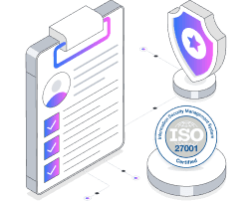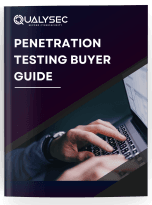FDA 510(k) Compliance
Qualysec follows various approaches and techniques to identify vulnerabilities and assess the security posture of medical devices, making them compliant with FDA 510(k).

What is FDA 510(k) Compliance?
FDA 510(k) Compliance refers to a premarket submission made to the U.S. Food and Drug Administration (FDA) to demonstrate that a medical device is safe and effective. This process is required for most Class II and some Class I and III devices before being marketed in the United States. The 510(k) submission must prove that the new device has the same intended use and technological characteristics as an already approved device, or if there are differences, they do not raise new questions of safety and effectiveness.
What is FDA 510(k) Pentesting?
FDA 510(k) Compliance Penetration Testing is a critical cybersecurity assessment process for medical devices seeking FDA approval through the 510(k) pathway. This specialized testing involves simulating real-world cyberattacks to identify and evaluate potential vulnerabilities in a device's software application. Qualysec assesses various aspects such as network security, access controls, data encryption, and update mechanisms.
Overview
How Qualysec Can Help You Achieve FDA 510(K) Compliance?
Qualysec can be a valuable partner in achieving FDA 510(k) Compliance for medical device security standards. With our expertise, we offer comprehensive services tailored to meet the strict requirements of the FDA 510(k) process. Our team makes sure that your healthcare device meets necessary safety and security standards before market submission.
FDA 510(k) Compliance Pentesting
FDA 510(k) Compliance Penetration Testing is a cybersecurity assessment for medical devices seeking market approval. It involves simulating cyberattacks to identify vulnerabilities in device software, firmware, and communication systems.
Vulnerability Assessments
We conduct thorough evaluations of your healthcare devices and related applications to identify potential security weaknesses in 510(k) medical devices.
Penetration Testing
We perform rigorous penetration tests to simulate real-world cyber attacks and assess device resilience.
Regulatory Guidance
We provide expert advice on interpreting and implementing FDA cybersecurity guidelines for 510(k) submissions.
Documentation Support
We assist in preparing comprehensive cybersecurity documentation required for 510(k) applications.
Risk Management
We help in developing and implementing risk management strategies to address identified vulnerabilities.
Continuous Monitoring
We offer ongoing security assessment services to maintain compliance throughout the device lifecycle.
Fast-Track Your Compliance Journey
Get a Pen Test Quote Now
Testimonials
Words of Satisfaction from Our Valued Clients
Read what our clients say about our services. See how Qualysec has helped several businesses to keep their digital assets safe!

Very prompt with service and replies.Qualysec Technologies was incredibly prompt in both their service delivery and their replies. I was impressed by their efficiency and professionalism. Highly recommended
Rishi Verma

Our experience with Qualysec was excellent. The thoroughness of testing, the quick response time and their team’s availability to brainstorm any queries feedback made the entire process as smooth as possible
Mike Perry

Qualysec did a great job identifying vulnerabilities in our web and cloud applications and gave us clear steps to fix them. They stuck to deadlines, handled re-tests, and supported well.
Kenny Kim


The team delivered clear, concise reports, categorized by severity levels of vulnerabilities. Each report included detailed technical insights and executive summaries for all stakeholders.
Mitul Pansuriya


Qualysec delivered a seamless experience with excellent project management and clear communication. The team was responsive, met deadlines, adapted well, and offered great post-delivery support.
Billy Sadhu Sharma Kumar


The most impressive qualities of this company were their exceptional communication and the robust, detailed reports they generated, and providing thorough guidance on necessary remediations.
Jordan Rothstein


Everything went as planned, with deliveries always on time. The team was smooth to work with, and their speed of execution stood out, making the whole process efficient and seamless.
Manuel Agustin Napoli


The team demonstrated exceptional professionalism with their consistently short response times and strict adherence to the project schedule. Their professionalism was impressive.
Andreas Schriefl


Qualysec did a great job identifying vulnerabilities in our web and cloud applications and gave us clear steps to fix them. They stuck to deadlines, handled re-tests, and supported well.
Pragnesh Chauhan


I was impressed by the level of detail put into the reporting was very detailed, including what steps were done to produce the issue and what we needed to do to remedy the issue. Everything was very well detailed and impressive.
Thomas Jones


The team was highly professional and consistently met all deadlines. They went above and beyond by expanding the project scope to address unexpected issues—despite having no obligation to do so. A truly dependable and great team to work with.
Chad Galgay


Our experience with Qualysec was excellent. The thoroughness of testing, the quick response time and their team’s availability to brainstorm any queries / feedback made the entire process as smooth as possible.
Jazel Oommen Verma


Our experience with Qualysec was very positive. They offer excellent service, communicated clearly with us throughout the process, and were very accommodating regarding our timelines.
Mike Perry


Qualysec Technologies was incredibly prompt in both their service delivery and their replies. I was impressed by their efficiency and professionalism. Highly recommended.
Rishi Verma

How To Get?
Qualysec FDA 510(k) Compliance Pentesting Process
Qualysec's FDA 510(k) Compliance Penetration Testing is a specialized testing that helps manufacturers identify and address potential vulnerabilities in their devices before submission to the FDA.
Stage 1
Pre-Assessment Planning
We collaborate with the device manufacturer to understand the device's functionality, review existing documentation, build a customized testing strategy aligned with FDA cybersecurity guidelines
Stage 2
Comprehensive Penetration Testing
We conduct thorough vulnerability scans of the device's software, perform simulated cyberattacks to identify potential security weaknesses and test various aspects.
Stage 3
Results Analysis and Reporting
We analyze test results to identify potential risks, and develop a detailed report outlining findings, risk assessments, and recommended remediation steps. We also offer support in preparing cybersecurity documentation for the 510(k) submission.
Get a quote
Schedule a Consultation for FDA 510(k) Compliance Pentesting!
Book a free initial consultation to discuss your medical device's specific needs and how our FDA 510(k) compliance penetration testing can help secure FDA approval. We share a personalized quote based on your device's complexity and testing needs.
4+
Years in Business
600+
Assessment Completed
150+
Trusted Clients
21+
Countries Served
FAQ
Frequently Asked Questions
Get quick answers to common questions about API security testing, its benefits, frequency, costs, and more.
What is FDA 510(k) compliance?
FDA 510(k) compliance refers to the process by which medical device manufacturers demonstrate that their product is as safe and effective as a legally marketed device, to gain approval for U.S. market entry.
What is FDA 510(k) compliance penetration testing?
It is the process of identifying cybersecurity vulnerabilities in a medical device to ensure its safe operation and compliance with FDA requirements.
Is penetration testing mandatory for FDA 510(k) compliance?
The FDA strongly encourages manufacturers to include cybersecurity assessments, such as penetration testing, to meet premarket submission guidelines.
What is the purpose of FDA 510(k) submission?
The purpose is to prove that a medical device is significantly comparable to one already on the market, giving confidence to the authorities about its safety and effectiveness before it is sold in the U.S.
When should penetration testing be conducted for FDA 510(k) compliance?
Penetration testing should be conducted during the device’s development phase, before submission, and periodically post-market to identify potential vulnerabilities.
What are the key areas assessed in FDA 510(k) penetration testing?
Key areas include device application, network connectivity, data encryption, access controls, and the ability to handle unauthorized access attempts.



